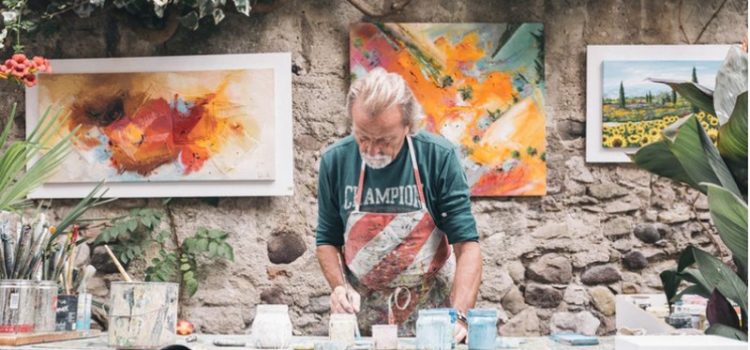

This article is an excerpt from the Shortform book guide to "Show Your Work" by Austin Kleon. Shortform has the world's best summaries and analyses of books you should be reading.
Like this article? Sign up for a free trial here .
Are you an artist struggling with motivation? What advice does artist Austin Kleon give on persevering through hard times?
In Show Your Work!, Austin Kleon emphasizes that being an artist isn’t easy. However, he offers three tips to help you stay motivated: maintain momentum, refresh and recharge, and reframe your past work.
Keep reading to learn artist motivation tips from Show Your Work!.
How to Stay Motivated as an Artist
Kleon warns that there will be both good times and hard times as an artist. Sometimes the only thing that separates the successful from the unsuccessful is sticking to it with motivation. Artists who quit prematurely may have already failed. Just keep at it and leave the door open to success whenever it may come. He offers three strategies that can help you persevere.
(Shortform note: According to some experts, perseverance is a critical part of success—it’s less about innate talent than it is about sticking with it and working hard. In her bestselling book, Grit, psychologist Angela Duckworth argues that your level of achievement is determined by how much skill you have and how much effort you put forth. As you increase your skill, your effort, or both, you increase your chances of success, no matter what your creative interest.)
1. Maintain Momentum
Kleon observes that many artists make it a habit to never stop at the end of a project. Instead, they always springboard into another project. Doing this ensures that they keep up momentum.
(Shortform note: In Big Magic, Elizabeth Gilbert offers several suggestions for maintaining your creative momentum. One particularly relevant practice is to be disciplined. Always try hard, she says, but maintain the joy of the creative process, too.)
2. Refresh and Recharge
As important as it is to keep up your momentum, sometimes you need to take a short break to refresh and renew your creative energy, contends Kleon. This will vary depending on your personality, but consider taking a short vacation, enjoying a cup of tea, or riding a bike. These and other similar activities can calm your mind and help spark creative ideas.
(Shortform note: Experts have found that a critical phase of the creative process is allowing yourself to recharge by entering an “absorb” state of mind. In this state, you uncritically take in environmental stimuli—the sound of the birds, the patterns on the wall, and so on. Your creative mind can store up these stimuli to then transform them into something new at another time.)
3. Reframe Your Past Work
As you share your work, you may find yourself becoming embarrassed of the work you’ve done in the past, warns Kleon. This can feel discouraging and make you consider quitting altogether. His third piece of advice for motivation is that artists should reframe these feelings. Rather than taking them as a sign of your mediocrity, take them as a sign that you’re learning and growing. This should be encouraging because, as he sees it, you’re never starting from scratch: You’re always building on what came before.
(Shortform note: Creativity experts note that cultivating a growth mindset is crucial for progressing as a creative individual. You have to view failures and mistakes as an opportunity to learn and improve. Be willing to fail, be willing to embarrass yourself—this willingness will help you stick it out for the long haul.)

———End of Preview———
Like what you just read? Read the rest of the world's best book summary and analysis of Austin Kleon's "Show Your Work" at Shortform .
Here's what you'll find in our full Show Your Work summary :
- How to succeed at your creative endeavors
- How to make money off your creative work
- Why you should share your creative process






